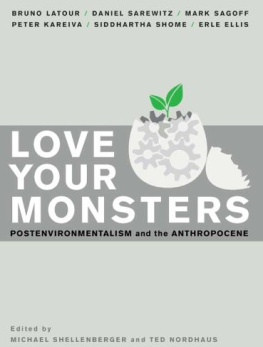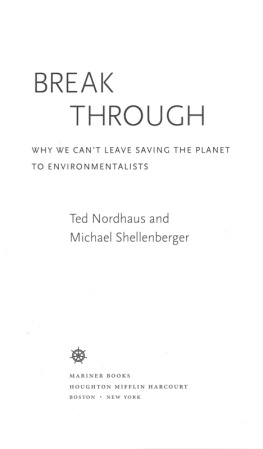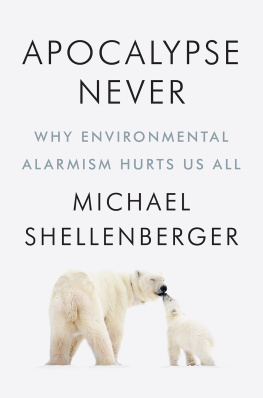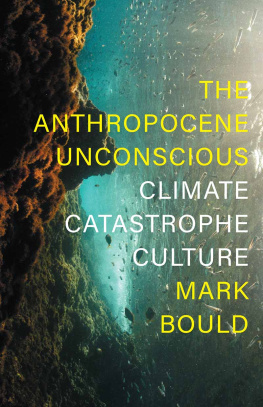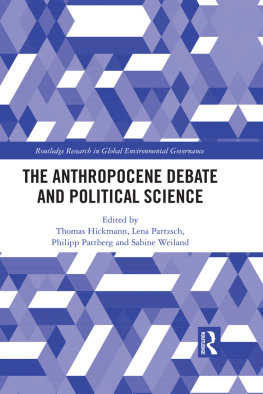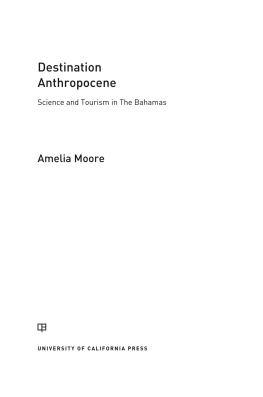Michael Shellenberger - Love Your Monsters: Postenvironmentalism and the Anthropocene
Here you can read online Michael Shellenberger - Love Your Monsters: Postenvironmentalism and the Anthropocene full text of the book (entire story) in english for free. Download pdf and epub, get meaning, cover and reviews about this ebook. year: 2011, publisher: Breakthrough Institute, genre: Romance novel. Description of the work, (preface) as well as reviews are available. Best literature library LitArk.com created for fans of good reading and offers a wide selection of genres:
Romance novel
Science fiction
Adventure
Detective
Science
History
Home and family
Prose
Art
Politics
Computer
Non-fiction
Religion
Business
Children
Humor
Choose a favorite category and find really read worthwhile books. Enjoy immersion in the world of imagination, feel the emotions of the characters or learn something new for yourself, make an fascinating discovery.
- Book:Love Your Monsters: Postenvironmentalism and the Anthropocene
- Author:
- Publisher:Breakthrough Institute
- Genre:
- Year:2011
- Rating:3 / 5
- Favourites:Add to favourites
- Your mark:
- 60
- 1
- 2
- 3
- 4
- 5
Love Your Monsters: Postenvironmentalism and the Anthropocene: summary, description and annotation
We offer to read an annotation, description, summary or preface (depends on what the author of the book "Love Your Monsters: Postenvironmentalism and the Anthropocene" wrote himself). If you haven't found the necessary information about the book — write in the comments, we will try to find it.
Michael Shellenberger: author's other books
Who wrote Love Your Monsters: Postenvironmentalism and the Anthropocene? Find out the surname, the name of the author of the book and a list of all author's works by series.
Love Your Monsters: Postenvironmentalism and the Anthropocene — read online for free the complete book (whole text) full work
Below is the text of the book, divided by pages. System saving the place of the last page read, allows you to conveniently read the book "Love Your Monsters: Postenvironmentalism and the Anthropocene" online for free, without having to search again every time where you left off. Put a bookmark, and you can go to the page where you finished reading at any time.
Font size:
Interval:
Bookmark:

LOVE YOUR MONSTERS
Postenvironmentalism and the Anthropocene
Edited by Michael Shellenberger
and Ted Nordhaus
Copyright by The Breakthrough Institute and the authors
ALL RIGHTS RESERVED
For information about permission to reproduce selections from this book, email btjournal@thebreakthrough.org
www.breakthroughjournal.org
Library of Congress Cataloging-in-Publication Data
Shellenberger, Michael, date
Love your monsters: postenvironmentalism and the anthropocene
p. cm.
ISBN 978-0-615-57220-8
1. Environment. 2. Anthropocene. 3. Climate changes. 4. Global environmental change. 4. Human beings Effect of climate on. I. Title
Book design by Dita Borofsky
E-book made in the United States of America

ABOUT THE AUTHORS
Michael Shellenberger and Ted Nordhaus
(Evolve,) are executive editors of the Breakthrough Journal and founders of the Breakthrough Institute.
Bruno Latour
(Love Your Monsters) is professor and vice president for research at Sciences Po Paris, and author of We Have Never Been Modern (Harvard 1993) and The Politics of Nature (Harvard 2004). He is a Breakthrough Institute Senior Fellow.
Peter Kareiva
(Conservation in the Anthropocene) is a Breakthrough Institute Senior Fellow and chief scientist and vice president of The Nature Conservancy and a member of the National Academy of Sciences. He, along with Michelle Marvier, is the author of Conservation Science (Roberts & Co 201).
Robert Lalasz
(Conservation in the Anthropocene) is director of science communications for The Nature Conservancy. He is founding editor of the Conservancys blog, Cool Green Science (blog.nature.org).
Michelle Marvier
(Conservation in the Anthropocene) is professor and department chair of Environmental Studies and Sciences at Santa Clara University. She recently coauthored Conservation Science with Peter Kareiva.
Erle Ellis
(Planet of No Return) is associate professor of Geography and Environmental Systems at the University of Maryland, Baltimore County.
Mark Sagoff
(The Rise and Fall of Ecological Economics) is director of the Institute for Philosophy and Public Policy at George Mason University and author of The Economy of the Earth (Cambridge 2007, nd ed).
Daniel Sarewitz
(Liberalisms Modest Proposals) is professor of Science and Society and codirector of the Consortium for Science, Policy & Outcomes at Arizona State University. His latest book is The Techno-Human Condition (MIT 2011; coauthored with Braden Allenby). He is a Breakthrough Institute Senior Fellow.
Siddhartha Shome
(The New India Versus the Globa l Green Brahmins) is an engineer at Parametric Technology Corporation and a Breakthrough Institute Senior Fellow.
INTRODUCTION
Ted Nordhaus and Michael Shellenberger

The last few years have been demoralizing for anyone who cares about the environment. Emissions continue to rise. Ancient forests continue to disappear. And the world appears unwilling or unable to do anything about it.
The ecological thinkers assembled in Love Your Monsters argue that environmentalism, in its failure to evolve, has become an obstacle to addressing these challenges. A political movement founded on shrinking the human footprint is doomed to fail in a world of seven going on ten billion souls seeking to live energy-rich modern lives.
But if this collection of essays delivers tough love to greens, it also offers hope. By 2100, nearly all of us will be prosperous enough to live healthy, free, and creative lives. Despite the claims of Malthusian pessimists, that world is both economically and ecologically possible. But to realize it, and to save what remains of the Earths ecological heritage, we must once and for all embrace human power, technology, and the larger process of modernization.
The idea that poor nations can be persuaded to choose a development path fundamentally different from the one pursued by the West is nave. Brazil is developing its forested interior, as Europe and the United States did before it, with dams, farms, ranches, and roads in order to sell its beef, soy, and minerals on foreign markets. Its indigenous people sell logging contracts; its rubber tappers run cattle. China, meanwhile, is now manufacturer to the world thanks to Confucian grit, industriousness, and cheap coal not waterwheels, solar panels, and respect for nature. In the process, China has lifted roughly half a billion peasants out of grinding poverty. And, as Siddhartha Shome observes in these pages, India has instead chosen modernization and integration into the global knowledge economy over the ascetic path advocated by Mahatma Gandhi.
For traditional greens, all of this is evidence that humankind is destroying itself but is it? Geographer Erle Ellis describes how humans have repeatedly transgressed ecological limits since we were hunter-gatherers. Human civilization rests not upon natural systems but human ones, like agriculture, cities, and industry, which have proven extraordinarily resilient to population and climatic pressures. Whats at stake, Ellis and the other thinkers assembled here argue, is not the survival of human civilization, but rather the contours and qualities of our gardened planet.
Though barely audible amidst the loud claims of imminent catastrophe, ecologists have decisively moved away from the conception of nature as a fragile system in a tenuous state of balance. Over the last two decades, Mark Sagoff notes, empirically oriented ecologists rejected the 1950s cybernetic view of nature as a system where any disruption could result in its collapse a theory that, Sagoff explains, was built upon the Christian doctrine that nature existed as a Great Chain of Being. In reality, esteemed conservation biologist Peter Kareiva and his colleagues observe, nature has proven extraordinarily resilient.
Rising economic optimism in poor nations has been matched, over the last two decades, by rising ecological pessimism in rich ones. As developed nations became knowledge economies, their populations enjoyed greater wealth to travel and experience the natural world, but also became increasingly alienated from material (i.e., agricultural and industrial) production. Rising anomie and disenchantment with modernity, we argue in our essay, Evolve, have driven rising skepticism about the ability of technology to improve our lives. Daniel Sarewitz observes that green liberalisms turn away from technology and modernity beginning in the 1960s also coincided with its turn toward a scientific rationality unmoored from appropriate moral and experiential foundations.
But if greens rejected technology and modernization in the 1960s, there is no reason they cant embrace them today. One of the founders of science and technology studies, Bruno Latour, points the way. Through a novel reading of Frankenstein , Latour argues that we must learn to love our technologies as we do our children not reject them at the first sign of trouble. And given the critical role played by tool use in human evolution, the two of us conclude, we must understand technology as natural and sacred, not alien and profane. A new, postenvironmental liberalism should thus, Sarewitz argues, understand technology as a public good a way to achieve broadly agreed upon societal goals, whether for improved health or cleaner air.
Font size:
Interval:
Bookmark:
Similar books «Love Your Monsters: Postenvironmentalism and the Anthropocene»
Look at similar books to Love Your Monsters: Postenvironmentalism and the Anthropocene. We have selected literature similar in name and meaning in the hope of providing readers with more options to find new, interesting, not yet read works.
Discussion, reviews of the book Love Your Monsters: Postenvironmentalism and the Anthropocene and just readers' own opinions. Leave your comments, write what you think about the work, its meaning or the main characters. Specify what exactly you liked and what you didn't like, and why you think so.

